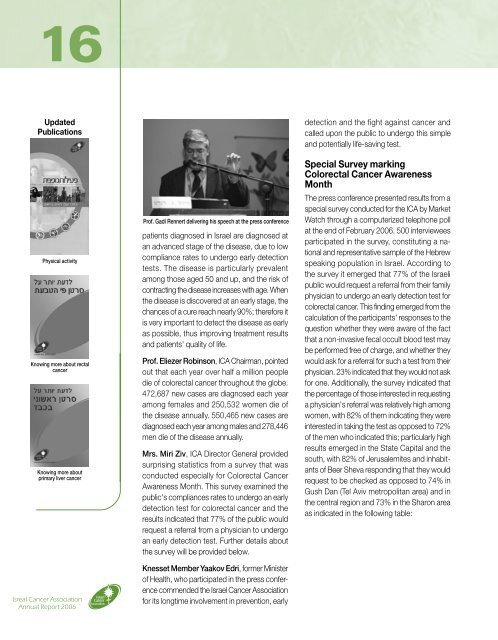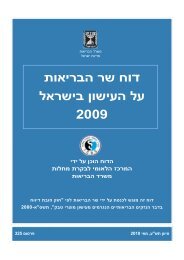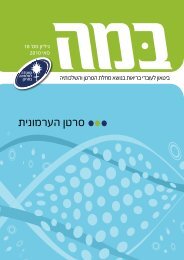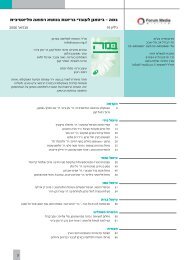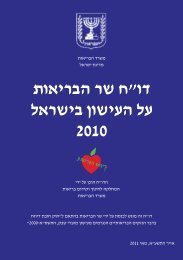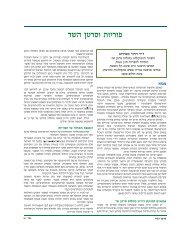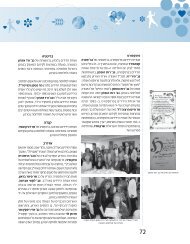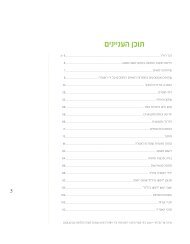Annual Report 2006
Annual Report 2006
Annual Report 2006
Create successful ePaper yourself
Turn your PDF publications into a flip-book with our unique Google optimized e-Paper software.
16<br />
Updated<br />
Publications<br />
Physical activity<br />
Knowing more about rectal<br />
cancer<br />
Knowing more about<br />
primary liver cancer<br />
Isreal Cancer Association<br />
<strong>Annual</strong> <strong>Report</strong> <strong>2006</strong><br />
Prof. Gadi Rennert delivering his speech at the press conference<br />
patients diagnosed in Israel are diagnosed at<br />
an advanced stage of the disease, due to low<br />
compliance rates to undergo early detection<br />
tests. The disease is particularly prevalent<br />
among those aged 50 and up, and the risk of<br />
contracting the disease increases with age. When<br />
the disease is discovered at an early stage, the<br />
chances of a cure reach nearly 90%; therefore it<br />
is very important to detect the disease as early<br />
as possible, thus improving treatment results<br />
and patients' quality of life.<br />
Prof. Eliezer Robinson, ICA Chairman, pointed<br />
out that each year over half a million people<br />
die of colorectal cancer throughout the globe.<br />
472,687 new cases are diagnosed each year<br />
among females and 250,532 women die of<br />
the disease annually. 550,465 new cases are<br />
diagnosed each year among males and 278,446<br />
men die of the disease annually.<br />
Mrs. Miri Ziv, ICA Director General provided<br />
surprising statistics from a survey that was<br />
conducted especially for Colorectal Cancer<br />
Awareness Month. This survey examined the<br />
public's compliances rates to undergo an early<br />
detection test for colorectal cancer and the<br />
results indicated that 77% of the public would<br />
request a referral from a physician to undergo<br />
an early detection test. Further details about<br />
the survey will be provided below.<br />
Knesset Member Yaakov Edri, former Minister<br />
of Health, who participated in the press conference<br />
commended the Israel Cancer Association<br />
for its longtime involvement in prevention, early<br />
detection and the fight against cancer and<br />
called upon the public to undergo this simple<br />
and potentially life-saving test.<br />
Special Survey marking<br />
Colorectal Cancer Awareness<br />
Month<br />
The press conference presented results from a<br />
special survey conducted for the ICA by Market<br />
Watch through a computerized telephone poll<br />
at the end of February <strong>2006</strong>. 500 interviewees<br />
participated in the survey, constituting a national<br />
and representative sample of the Hebrew<br />
speaking population in Israel. According to<br />
the survey it emerged that 77% of the Israeli<br />
public would request a referral from their family<br />
physician to undergo an early detection test for<br />
colorectal cancer. This finding emerged from the<br />
calculation of the participants' responses to the<br />
question whether they were aware of the fact<br />
that a non-invasive fecal occult blood test may<br />
be performed free of charge, and whether they<br />
would ask for a referral for such a test from their<br />
physician. 23% indicated that they would not ask<br />
for one. Additionally, the survey indicated that<br />
the percentage of those interested in requesting<br />
a physician's referral was relatively high among<br />
women, with 82% of them indicating they were<br />
interested in taking the test as opposed to 72%<br />
of the men who indicated this; particularly high<br />
results emerged in the State Capital and the<br />
south, with 82% of Jerusalemites and inhabitants<br />
of Beer Sheva responding that they would<br />
request to be checked as opposed to 74% in<br />
Gush Dan (Tel Aviv metropolitan area) and in<br />
the central region and 73% in the Sharon area<br />
as indicated in the following table:


